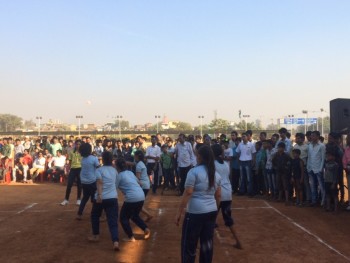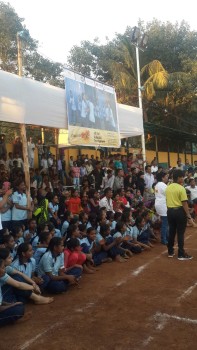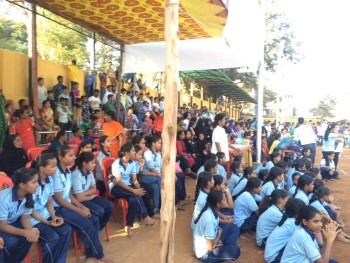
ICRW Program Gives Girls in Mumbai Slum the Chance to Claim Public Spaces
Adolescent Girls, Adolescents and Youth, Economic Opportunity & Security, Sports for Development, Violence Against Women and Girls
04 January 2016
Media Contact
Yesterday, girls in the Shivaji Nagar slum community in Mumbai got to ring in the New Year by doing something unexpected: playing sports in public spaces.
To many, this may not seem like a big deal, but in Shivaji Nagar, public spaces – and especially playing sports in these public spaces – are typically reserved only for men and boys. Girls’ place, according to social norms and beliefs in the community, is typically in the household, doing chores like cooking and cleaning and taking care of their siblings.

Through the International Center for Research on Women’s (ICRW) Parivartan for Girls program, female mentors between the ages of 18 and 24 train and coach teams of girls between the ages of 12 and 16 to play kabaddi, a wrestling-like sport popular in South Asia. In between kabaddi sessions, the girls also participate in reflective workshops, which include discussions around life skills such as confidence, communication and self-esteem to build agency and the importance of higher education. Within these workshops, girls are provided information to better understand health, relationships and marriage, gender violence and sexual harassment.
The kabaddi tournament yesterday was the culmination of months of hard work by girls who are fighting back against restrictive norms in their community. More than 500 people from the community came out to watch the girls play, including men and boys who comprised the majority of the audience.
Over the past 18 months, mentors from the program recruited girls to play on their team, giving them the opportunity to play kabaddi, which is significant because while many girls know about kabaddi, few – if any – have ever had the opportunity to play the sport. And while the sports component is an exciting part of the program, it’s just one piece of the empowerment puzzle. The rest of the program is designed to address some of the barriers faced by young girls in Shivaji Nagar, by also engaging in discussions around life and negotiation skills, which will allow them to negotiate with their parents to continue their education, creating a supportive environment for girls at the family and community level and fostering a safe space in the community where girls can gain confidence and learn team work. To make sure that the change the program has intended to create is sustained, Parivartan also works with parents and the broader community, to help shift the way families and members of the community perceive the value of girls.

So far, we’ve seen progress in the attitudes and confidence of girls who participate in the program. Girls have said they have acquired better communication and negotiation skills, which have become instrumental in allowing them to continue their education, as well as helping girls who have dropped out return to school. Girls have also repeatedly report that they now feel more comfortable with their own body, which they attribute to playing sports and participating in the program. As one mentor recently remarked, “I don’t bother [with] what people will think and say [about] what I wear, I feel empowered when I see myself in the sport outfit and I wear them at home before reaching the grounds every Sunday. My neighbor use to feel uncomfortable about my way of life but I think gradually its just the matter of habit. Now they have accepted the change.”
This is good news.
Despite the impact Parivartan has had on girls’ lives, however, implementing the Parivartan program has not been without its challenges. Changing the way communities view the value of girls is an uphill battle and that dynamic is clearly shown here. There have been several barriers to girls’ participation in the program, first and foremost, encountering resistance from girls’ fathers and older brothers, who don’t think that girls should be able to participate because they don’t view playing sports as an appropriate activity for girls. Of those who signed up for the program, but don’t regularly participate or have dropped out, one in five girls report it’s because of push back from their father and/or brothers.
Participating girls believes that there are many social norms that exist, whic reinforce restrictions on their movement as well as participation in any activities that are outside their home. More than eight in ten girls surveyed report that a family’s honor lies with the girl. One in every two girls surveyed said that public spaces are considered only for men. Of the girls who participated in the program three in five stated that they had to finish all of their chores first before they could ask their parents to play. Boys in their family typically wouldn’t have to complete the same chores, which are seen as the duty of girls.

While ICRW has yet to conduct the assessment on the effectiveness of the program yet, it was clear from the tournament this weekend how important this milestone was, both for the girls and the mentors. Parivartan has brought a smile to girls’ faces who participate in the program and every single girl who played in the tournament appeared confident and ready to play. While I always expected that the girls would grow confidence from the program, it was amazing to hear parents of both mentors and girls talk about how proud they were to be watching their daughter play kabaddi in public. Further, it was clear from their attitude that they have a newfound freedom around their bodies and the confidence to claim the public space that have previously not been perceived to be for women and girls.
This is a strong start. We know that it takes a long time to begin to uproot harmful gender norms, including those that restrict girls in Shivaji Nagar. But Parivartan – and the tournament this weekend – was a great start. Before the program, there was so much fear around girls walking down streets. The community has put so much pressure on girls not to be visible; to stay hidden in their houses and avoid risky situations. Yesterday, that changed. Parivartan girls and mentors showed that they can actually claim public space and that they no longer must remain invisible. It painted a powerful picture that girls can have the opportunity to play sports, to be outside, to go to school, and that all of this not only makes girls happy, but is healthy and critical to them as they grow into strong, confident women.
